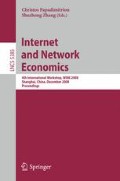Abstract
This paper explores the relation between equilibrium coarsenings and equilibrium refinements via Bertrand competition example and similar situations, it shows that the typical equilibrium coarsening -— a unique correlated equilibrium -— is equivalent to the unique Nash equilibrium itself, is also equivalent to the equilibrium refinement, for the standard n-firms Bertrand competition model with linear demand and symmetric, linear costs in the most special and simplest case, and compares some wonderful and remarkable differences of the existence, uniqueness, stability, connectivity, and strategic property of Nash equilibrium and correlated equilibrium between Cournot and Bertrand model. We also propose some open questions.
Access this chapter
Tax calculation will be finalised at checkout
Purchases are for personal use only
Preview
Unable to display preview. Download preview PDF.
References
Abreu, D., Milgrom, P., Pearce, D.G.: Information and Timing in Repeated Partnerships. Econometrica 59(6), 1713–1733 (1991)
Aoyagi, M.: Collusion in dynamic Bertrand oligopoly with correlated private signals and communication. Journal of Economic Theory 102, 229–248 (2002)
Aumann, R.J.: Subjectivity and correlation in randomized strategies. Journal of Mathematic Economics 1, 67–96 (1974)
Aumann, R.J., Dreze, J.H.: Rational Expectations in Games. American Economic Review 98(1), 72–86 (2008); See also: When All is Said and Done, How Should You Play and What Should You Expect? Discussion paper no.387, Center for the Study of Rationality of The Hebrew University of Jerusalem (2005)
Aumann, R.J., Serrano, R.: An economic Index of Riskiness. Discussion paper no.446, Center for the Study of Rationality of The Hebrew University of Jerusalem (2007)
Bergemann, D., Morris, S.: Belief Free Incomplete Information Games. In: Papadimitriou, Zhang (eds.) Proceeding of Workshop on Internet and Network Economics. Springer, Heidelberg (2008)
Bernheim, D.: Rationalizable strategic behavior. Econometrica 52, 1007–1028 (1984)
Brandenburger, A., Dekel, E.: Rationalizability and correlated equilibrium. Econometrica 55, 1391–1402 (1987)
Bulow, J., Geanakoplos, J.D., Klemperer, P.D.: Multimarket oligopoly: Strategic Substitutes and Complements. Journal of Political Economy 93(3), 488–511 (1985)
Calvó-Armengol, A.: The Set of Correlated Equilibria of 2*2 Games, http://selene.uab.es/acalvo
Chwe, M.S.-Y.: Incentive Compatibility Implies Signed Covariance (2006), www.chwe.net/michael/i.pdf
Foster, D.P., Hart, S.: An Operational Measure of Riskiness, Discussion paper no.454, Center for the Study of Rationality of The Hebrew University of Jerusalem (2007)
Foster, D.P., Hart, S.: A Reserve-based Axiomatization Of the Measure of Riskiness, Discussion paper, Center for the Study of Rationality of The Hebrew University of Jerusalem (2008)
Fudenberg, D., Levine, D.: Repeated Games with Frequent Signals. Quarterly Journal of Economics (to appear, 2008)
Gul, F.: A Comment on Aumann’s Bayesian View. Econometrica 66, 923–927 (1998)
Hart, S.: Five Questions on Game Theory. In: Hendricks, V.F., Hansen, P.G. (eds.) Game Theory: 5 Questions, pp. 97–107. Automatic Press (2007)
Jackson, M.O.: The Economics of Social Networks. In: Blundell, R., Newey, W., Persson, T. (eds.) Advances in Economics and Econometrics, Theory and Applications. Cambridge University Press, Cambridge (2006)
Jackson, M.O., Wolinsky, A.: A strategic Model of Social and Economic networks. Journal of Economic Theory 71, 44–74 (1996)
Liu, L.: Correlated equilibrium of Cournot oligopoly competition. Journal of Economic Theory 68, 544–548 (1996)
Mahdian, M., McAfee, R.P., Pennock, D.: The Secretary Problem with a Hazard Rate Condition. In: Papadimitriou, Zhang (eds.) Proceeding of Workshop on Internet and Network Economics. Springer, Heidelberg (2008)
Maskin, E.S.: Introduction to Recent Developments in Game Theory. Edward Elgar Publishing (1999)
Milgrom, P., Roberts, J.: Rationalizability, learning and equilibrium in games with strategic complementarities. Econometrica 58, 1255–1278 (1990)
Myerson, R.B.: Dual Reduction and Elementary Games. Games and Economic Behavior 21, 183–202 (1997)
Nau, R.F., Gomez Canovas, S., Hansen, P.: On the Geometry of Nash Equilibria and Correlated Equilibria. International Journal of Game Theory 32, 443–453 (2004)
Neyman, A.: Correlated Equilibrium and Potential Games. International Journal of Game Theory 26, 223–227 (1997)
Pearce, D.G.: Rationalizable Strategic Behavior and the Problem of Perfection. Econometrica 52(4), 1029–1050 (1984)
Qin, C.-Z., Stuart, C.: Are Cournot and Bertrand equilibria evolutionary stable strategies? Journal Evolutionary Economics 7, 41–47 (1997)
Sekiguchi, T.: Uniqueness of equilibrium payoffs in finitely repeated game with imperfect monitoring. The Japanese Economic Review 56(3), 317–331 (2005)
Van Damme, E.: Strategic Equilibrium. In: Aumann, R., Hart, S. (eds.) Handbook of Game Theory, ch. 41, vol. III. North Holland, Amsterdam (2002)
Van Damme, E.: On the State of the Art in Game Theory: An Interview with Robert Aumann. Games and Economic Behavior 24, 181–210 (1998)
Viossat, Y.: Openness of the set of games with a unique correlated equilibrium. cahier du laboratoire d’éeconoméetrie 2005-28, Ecole polytechnique, France (revised in, 2006)
Ui, T.: Correlated Equilibrium and Concave Games. International Journal of Game Theory 37(1), 1–13 (2008)
Yi, S.: On the Existence of a Unique Correlated Equilibrium in Cournot Oligopoly. Economics Letters 54, 235–239 (1997)
Young, H.P.: The Possible and the Impossible in Multi-Agent Learning. Artificial Intelligence 171, 429–433 (2007)
Zheng, B.: Approximate efficiency in repeated games with correlated private signal. Games and Economic Behavior 63(1), 406–416 (2008)
Author information
Authors and Affiliations
Editor information
Editors and Affiliations
Rights and permissions
Copyright information
© 2008 Springer-Verlag Berlin Heidelberg
About this paper
Cite this paper
Wu, J. (2008). Correlated Equilibrium of Bertrand Competition. In: Papadimitriou, C., Zhang, S. (eds) Internet and Network Economics. WINE 2008. Lecture Notes in Computer Science, vol 5385. Springer, Berlin, Heidelberg. https://doi.org/10.1007/978-3-540-92185-1_24
Download citation
DOI: https://doi.org/10.1007/978-3-540-92185-1_24
Publisher Name: Springer, Berlin, Heidelberg
Print ISBN: 978-3-540-92184-4
Online ISBN: 978-3-540-92185-1
eBook Packages: Computer ScienceComputer Science (R0)

